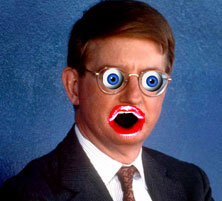
George Will saw fit to use
his column in The Washington Post today to call for the death of Public Television. I beg to differ.
Cut Buster Loose
By George F. Will
Thursday, March 3, 2005; Page A25
In 1967 Lyndon Johnson added yet another piece to the jigsaw puzzle of national perfection: The Corporation for Public Broadcasting was born. Public television was a dubious idea even when concocted as a filigree on the Great Society. Why should government subsidize the production and distribution of entertainment and, even worse, journalism? Even if there were -- has there ever been? -- a shortage of either in America, is it government's duty to address all cultural shortages?
Well, let's see. Should America have offered money in order to offer a unique point of view? To produce information that helps to serve communities not often served by the three major networks? Should America have shown itself to be a proud investor in the cultural and educational future of its population?
Today, with iPod earphone cords dangling from millions of heads, and movies flooding into homes where they jostle for plasma screen time with video games, Americans are entertaining themselves into inanition. Furthermore, journalism and imitations of it have become social smog. Even in airport concourses you are bombarded by televised human volcanoes verbally assaulting each other about the "news," broadly -- very broadly -- defined to include Kobe Bryant's presence on Michael Jackson's witness list.
Will loses his way here. I haven't heard a peep about Kobe Bryant or Michael Jackson on any PBS program. He tries to insinuate the utter crap imposed on us by commercial "news" is also present on PBS. But he simply proves the point that PBS offers a unique point of view.
Maybe not. Maybe Will was tuned into VH1 instead of PBS by mistake. He strikes me as the kind of guy still has "12:00" blinking on his (now outdated) VCR.
In 1967 public television did at least increase, for many, the basic television choices from three -- CBS, NBC, ABC -- to four. Not that achieving some supposedly essential minimum was, or is, the government's business. In today's 500-channel environment, public television is a preposterous relic. Not too long ago the Public Broadcasting Service tried an amazingly obtuse and arrogant slogan: "If PBS doesn't do it, who will?" What was the antecedent of the pronoun "it"? Presumably "culture" or "seriousness" or "relevance." Or something. But in a television universe that includes the History Channel, Biography, A&E, Bravo, National Geographic, Disney, TNT, BBC America, Animal Planet, the Learning Channel, the Outdoor Channel, Noggin, Nickelodeon, and scads of other cultural and information channels, what is the antecedent?
Would you like a list? OK, and this will be a
refrain, so be ready to come back to it. Let's look at the shows that would not be produced outside of PBS:
1.
NOVA 2.
Frontline3.
1900 House and other decent "reality" shows without endless product placement
4.
NewsHour 5.
The Mark Twain Prize 6. Your choice of excellent long form documentaries:
Jazz,
The Civil War, etc.
7.
American Experience8. Charlie Rose
9.
EGG The Arts Show 11. - 100. Simply check out a list of
PBS' programming to see more.
None of the "commercial" networks would touch these shows. They are not marketable, and in many cases, are too educational. Oh, that dreaded word. Additionally, PBS has seen fit not to put Paris Hilton in
any of them.
Now PBS is airing some HBO films. There is a nifty use of tax dollars -- showing HBO reruns. Which contribute how to "diversity"?
Let's address this. PBS showed an HBO production about a dirty bomb going off in the middle of London. It was followed by a town hall meeting featuring many experts in terrorism that allowed the free discussion of terrorism in a major metropolitan area. It included a questioning about the realism of the movie and a discussion of the current preparedness of major US cities. How on EARTH could that be relevant? Damn you PBS! Damn you!
It's a nice way of Willie-Filly trying to make everyone think "PBS showed The Sopranos?" by not going into specifics. Preposterous.
In 1967 public television's enthusiasts were ahead of the curve of cultural inanity, making frequent use of the d-word, which required decades more to become the great signifier of cultural correctness. The chairman of the Federal Communications Commission hailed public television's promise of "more diversity," and a Carnegie report foresaw increased "diversities." Thirty-eight years later, 500 channels mock public television as crucial to diversity.
Back to the
refrain. Which shows are not possible without PBS? See the list Willie.
The recent spat about Buster, PBS's cartoon rabbit, visiting two lesbian parents quickly became a second spat about the Education Department's threat to stop financing Buster. But a third spat should have been about why the Education Department (a fourth spat: Is that department necessary?) is paying for any of Buster's adventures. Is there a desperate shortage of television cartoons? Is Buster to other cartoons as Beethoven is to Bon Jovi?
Will shows his lack of knowledge right here. He obviously has not been watching children's television (It's a shame, he would have learned the golden rule). Buster IS to other cartoons what Beethoven is to Bon Jovi. Watch Buster, then watch Pokeman. Get the picture?
Public television, its supporters say, is especially important for people who cannot afford cable or satellite television. But 62 percent of poor households have cable or satellite television, and 78 percent have a VCR or DVD player.
So now if most people do not depend on it, toss it to the scrapheap? Most people don't use National Endowment for the Arts grants, so should we ditch those, too? (Don't answer that Will, I know your evil answer.) Most people polled don't want Social Security reform, so I'm waiting on your denouncement for that "Biggie Wills".
Public television is akin to the body politic's appendix: It is vestigial, purposeless and occasionally troublesome. Of the two arguments for it, one is impervious to refutation and the other refutes itself. The impervious argument is: The small size of the audiences for most of public television's programming proves how necessary public television is. The big networks gather big audiences by catering to vulgar cultural tastes, leaving the refined minority an orphan, because any demand the private market satisfies must be tacky.
The self-refuting argument is: Big Bird. Never mind that the average age of PBS viewers is 58. "Sesame Street" -- see how its merchandise sells, and Barney's, too -- supposedly proves that public television can find mass audiences.
He almost got me here. Almost. Will forgets that Sesame Street never would have been put on the air without help from the Corporation for Public Broadcasting. Would anyone at a major commercial station jump on a show that was billed as: "Well, we have this guy who's great with puppets, and we're going to sing about letters and have some psychedelic cartoons too. Plus, a frog that does the news." Will puts the cart before the horse ... or rather, the merchandising before the programming investment. I can make wild claims too:
Kids, George Will wants to stuff Grover in a blender.
But the refined minority, as it sees itself, now has ample television choices for the rare moments when it is not rereading Proust.
Willie-Billie.. none of us "refined minority" are touching Proust anymore. It's all about Satre! Do your research!
And successes such as "Sesame Street" could easily find private, taxpaying broadcast entities to sell them.
Now they can. What about all the new shows that don't have a chance to build an audience without this support? Those, oddly, are not mentioned.
President Johnson, no slouch at the "progressive" rhetoric of platitudinous gush, said the prospect of public television should fill Americans with "the same awe and wonderment" that caused Samuel Morse, when he successfully tested his telegraph, to exclaim, "What hath God wrought?" But by 2002 PBS President Pat Mitchell was warning: "We are dangerously close in our overall prime-time numbers to falling below the relevance quotient."
That statement says more about Pat Mitchell, and why she should be sacked immediately, than about PBS programming.
Public television's survival, with no remaining rationale, should fill students of government with awe, wonderment and melancholy. Would it vanish without the 15 percent of its revenue it gets from government? Let's find out.
This was the most shocking line in the entire piece for me. PBS only get 15% of its revenue from the government?! No wonder the programming is not fit for "Will the Thrill."
Let's raise that to 50% - proving that America cares about topics and programming ignored by commercial media - instead of making PBS just another random channel in a 500-channel universe. How about that Will?
Will?
 From Page Six [via Defamer]:
From Page Six [via Defamer]:

 My regular readers (My God, how I love the three of you) will notice the addition of google ads to the top of this page. I'll admit that I was torn when deciding whether to put them up or not. But, as with most things I do, I figured I'd at least get a decent blog entry out of it.
My regular readers (My God, how I love the three of you) will notice the addition of google ads to the top of this page. I'll admit that I was torn when deciding whether to put them up or not. But, as with most things I do, I figured I'd at least get a decent blog entry out of it.
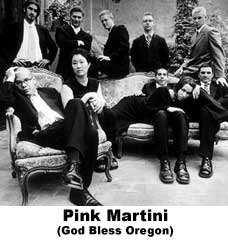 This is where I earn my street cred. (stop laughing)
This is where I earn my street cred. (stop laughing)
 There are few things I am comfortable with when talking about traveling. I'm not sure what type of
There are few things I am comfortable with when talking about traveling. I'm not sure what type of 




 First, on a personal note, the movie
First, on a personal note, the movie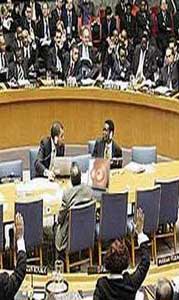 You know, I'm the first one to stand up for the United Nations. Programs they have implemented have worked, and while they don't get it right all the time, I think they are really trying. I don't appreciate the current US administration always putting them down.
You know, I'm the first one to stand up for the United Nations. Programs they have implemented have worked, and while they don't get it right all the time, I think they are really trying. I don't appreciate the current US administration always putting them down.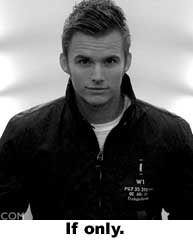 I've never been much into watching big cars race around a track really fast. As my sister might say, "That's not a sport, it's traffic." Actually, I think she did say that.
I've never been much into watching big cars race around a track really fast. As my sister might say, "That's not a sport, it's traffic." Actually, I think she did say that. My election thoughts - typed up in the early hours of November 3rd - the day after the Presidential Election were posted to
My election thoughts - typed up in the early hours of November 3rd - the day after the Presidential Election were posted to 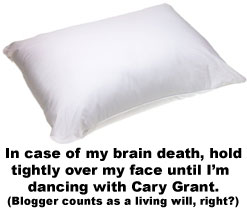 Terri Schiavo. Extraordinary action was taken by Congress this weekend in order to bring her case to Federal Court. (If you pay taxes in the U.S. - thanks! You paid for those flights back to D.C.) The President signed the passed bill in the hallway of the White House, outside of his bedroom.
Terri Schiavo. Extraordinary action was taken by Congress this weekend in order to bring her case to Federal Court. (If you pay taxes in the U.S. - thanks! You paid for those flights back to D.C.) The President signed the passed bill in the hallway of the White House, outside of his bedroom.
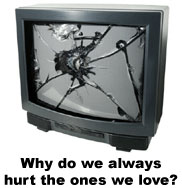 How can I possibly have over seventy channels to choose from, and there is still nothing on television? Cable television is a testament to the ingenuity and the heterogeneous nature of the country.
How can I possibly have over seventy channels to choose from, and there is still nothing on television? Cable television is a testament to the ingenuity and the heterogeneous nature of the country.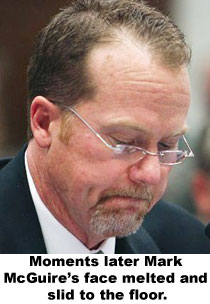 Let the photo to the right be a warning to all you sporty men out there. Not only will steroids
Let the photo to the right be a warning to all you sporty men out there. Not only will steroids  People come to Washington, DC for the monuments and memorials. There are grand new monuments like the
People come to Washington, DC for the monuments and memorials. There are grand new monuments like the  A few random bits...
A few random bits... 3. I can give Dick Cheney the finger IN PERSON.
3. I can give Dick Cheney the finger IN PERSON.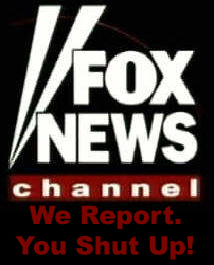 From
From  There is no greater celebration of your country than the delicate mixture of our national bird - the regal bald eagle - and a sharp hunting knife. Sadly, these beautiful creates can no longer be killed and gutted, but this precision instrument is perfect for use on manatees, lemurs and panda bears. In just one of the many fine attentions to detail, just like in real life, when the eagle opens its mouth, a four inch blade shoots out. Limited Edition: Be sure to get your endangered piece today!
There is no greater celebration of your country than the delicate mixture of our national bird - the regal bald eagle - and a sharp hunting knife. Sadly, these beautiful creates can no longer be killed and gutted, but this precision instrument is perfect for use on manatees, lemurs and panda bears. In just one of the many fine attentions to detail, just like in real life, when the eagle opens its mouth, a four inch blade shoots out. Limited Edition: Be sure to get your endangered piece today!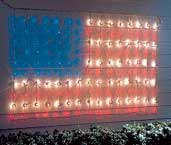 Nothing says "Patriot" like this oversized American flag with 150 bright lights that only Middle-East oil fueled electricity can ignite. This unique and blinding product is sure to prove your love of all things free to the neighborhood. Because you've heard what they've been saying behind your back, right? Oh. I shouldn't have brought it up. No, no, do whatever you want, Frenchie.
Nothing says "Patriot" like this oversized American flag with 150 bright lights that only Middle-East oil fueled electricity can ignite. This unique and blinding product is sure to prove your love of all things free to the neighborhood. Because you've heard what they've been saying behind your back, right? Oh. I shouldn't have brought it up. No, no, do whatever you want, Frenchie. In this crazy modern world, full of condos and new living arrangements, it's easy to forget the important things of yester-year. Be sure your family cherishes the important traditions: like this life-like creepy neighbor statue. Fully hand-made and painted - the insertion of two D batteries (not included) enables the statue to recite such classic phrases as "I think I may have some delicious candy in my basement." and "I have a quarter for you, but it's deep, deep,
In this crazy modern world, full of condos and new living arrangements, it's easy to forget the important things of yester-year. Be sure your family cherishes the important traditions: like this life-like creepy neighbor statue. Fully hand-made and painted - the insertion of two D batteries (not included) enables the statue to recite such classic phrases as "I think I may have some delicious candy in my basement." and "I have a quarter for you, but it's deep, deep, 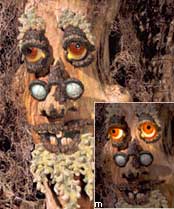 Neighbor kids and even your own children getting a little too cocky? It's easy to mentally scar them and drive them from environmentalism at the same time with this oversized "face-in-the-tree." The eyes light up at night under the power of pure evil - think of the money you will save on batteries! Also included: a bag of pine scented sawdust to absorb the "spray of joy" (sometimes called vomit) from your child after they get a good look at this.
Neighbor kids and even your own children getting a little too cocky? It's easy to mentally scar them and drive them from environmentalism at the same time with this oversized "face-in-the-tree." The eyes light up at night under the power of pure evil - think of the money you will save on batteries! Also included: a bag of pine scented sawdust to absorb the "spray of joy" (sometimes called vomit) from your child after they get a good look at this. I'm the first to admit it, because I know from first-hand experience. The performing arts is a damn hard thing to market. Fucking impossible if you're working with modern dance in Washington, DC.
I'm the first to admit it, because I know from first-hand experience. The performing arts is a damn hard thing to market. Fucking impossible if you're working with modern dance in Washington, DC. I walk to and from work every day. After having done this for a few years, I've come to appreciate some of the aspects: it's wonderful to get that much fresh air every day, it's easy to get a nice tan on my face during the summer, and it gives me time to clear my head before, and after, work.
I walk to and from work every day. After having done this for a few years, I've come to appreciate some of the aspects: it's wonderful to get that much fresh air every day, it's easy to get a nice tan on my face during the summer, and it gives me time to clear my head before, and after, work. A recent commercial advertisement for the Go RVing Coalition caught my eye. (
A recent commercial advertisement for the Go RVing Coalition caught my eye. ( From the
From the  If you need to install a security system to watch your kids - and describe your relationship with them as a "battle," you've got much bigger problems then the slimy kid next-door slipping into your daughter's room late at night. You may want to look into a system called "family therapy", No motion-sensors necessary.
If you need to install a security system to watch your kids - and describe your relationship with them as a "battle," you've got much bigger problems then the slimy kid next-door slipping into your daughter's room late at night. You may want to look into a system called "family therapy", No motion-sensors necessary.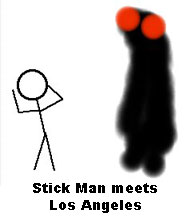 I apologize for the odd lack of a post yesterday, but after this week at work, I came home, went to bed, and just recently saw consciousness again. It's amazing how a long, good night of sleep can improve your outlook. I'm glad the president gets 12 hours of it a day.
I apologize for the odd lack of a post yesterday, but after this week at work, I came home, went to bed, and just recently saw consciousness again. It's amazing how a long, good night of sleep can improve your outlook. I'm glad the president gets 12 hours of it a day. George Will saw fit to use
George Will saw fit to use  I had nothing to write tonight. On my way home from work, my ears turning a bright crimson (thank you very much blinding freezing wind), I thought to myself, "Self, you pitiful excuse for a blogger, you've nothing to write about."
I had nothing to write tonight. On my way home from work, my ears turning a bright crimson (thank you very much blinding freezing wind), I thought to myself, "Self, you pitiful excuse for a blogger, you've nothing to write about." Do NOT watch the movie The Shining. This wastes time - especially if you are watching that
Do NOT watch the movie The Shining. This wastes time - especially if you are watching that  Do NOT go camping with the Swiss. They will force you to hang flags - and will not even let you sleep in the "Swiss" tent. You'll wake up in the middle of the night to find your Swiss friend groping you and looking for spare change.
Do NOT go camping with the Swiss. They will force you to hang flags - and will not even let you sleep in the "Swiss" tent. You'll wake up in the middle of the night to find your Swiss friend groping you and looking for spare change. Take care not to over-pluck your eyebrows. If over-plucking occurs, please go blind and cover your face in shame.
Take care not to over-pluck your eyebrows. If over-plucking occurs, please go blind and cover your face in shame. Do NOT let extremely gay men run into your life. You've been down that road too, too many times, girl.
Do NOT let extremely gay men run into your life. You've been down that road too, too many times, girl. If you find yourself trapped under enormous, oddly-shaped
If you find yourself trapped under enormous, oddly-shaped 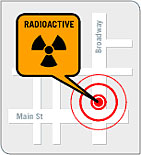 Remember that
Remember that  In the event of a true major disaster, honestly, kiss all this shit goodbye.
In the event of a true major disaster, honestly, kiss all this shit goodbye. I warned you about him.
I warned you about him.
